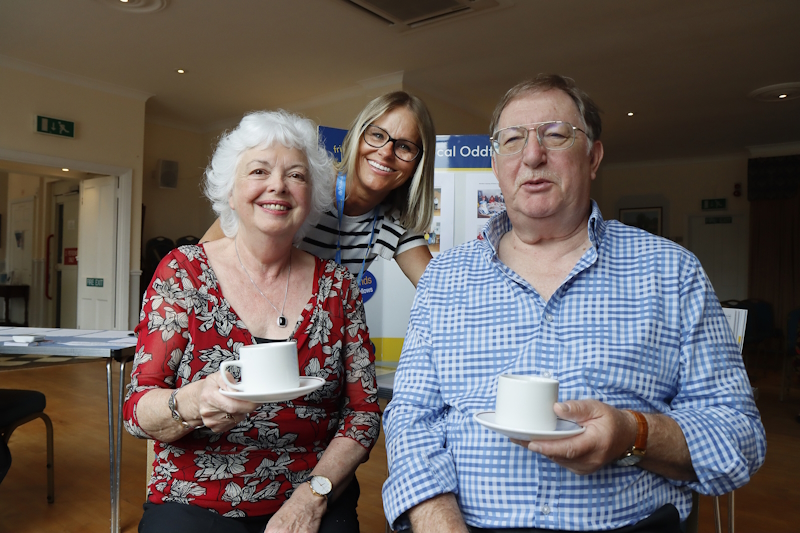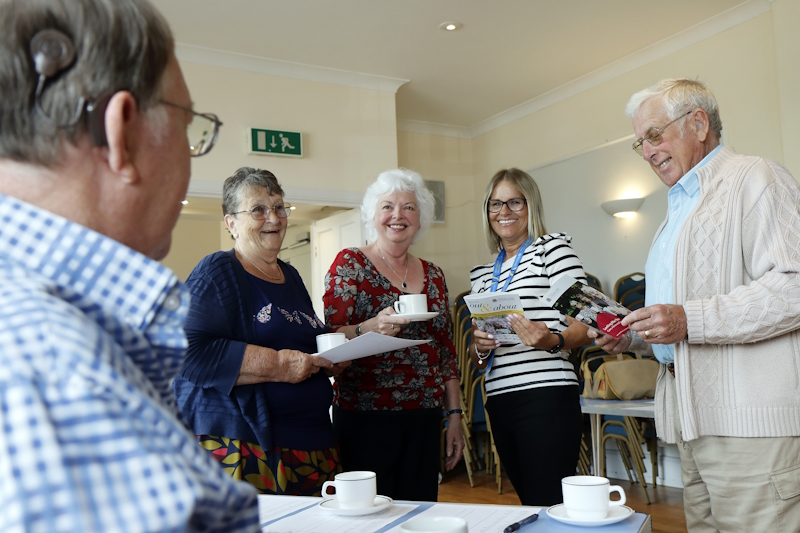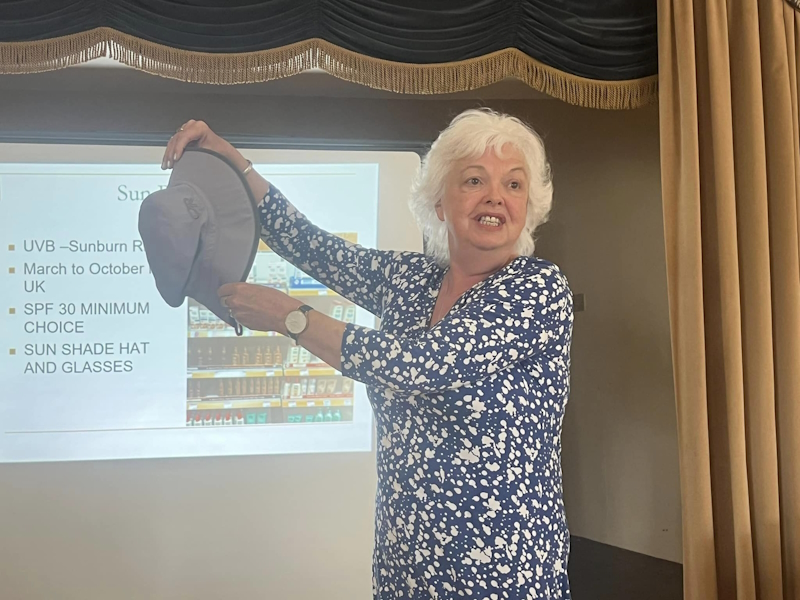A fresh challenge in retirement
Updated: 28 Jan 2025
When your career in the NHS has been as remarkable as Marie’s, having a retirement that matches in its rewards was always going to be a challenge. But by shifting her relentless drive to care, learn and contribute in a new direction, it has, as she describes, “opened up another life”.
Ambitious Marie Retzback, 70, from Sudbury, Suffolk, retired from her high-achieving healthcare career at the age of 64.
 Marie Retzback and husband Philip (front), with friend, Helen Patel, Social Organiser for Babergh Oddfellows
Marie Retzback and husband Philip (front), with friend, Helen Patel, Social Organiser for Babergh Oddfellows
She left Dublin for London in 1972 and began her career in nursing, training as a State Registered Nurse at Oldchurch Hospital in Romford. It marked the start of a 46-year accumulation of nursing qualifications across a range of specialities.
She met Philip at 18 and they married when she was 21. Seven years later, they had three children. Working as a Night Duty Staff Nurse at the City’s Whipps Cross Hospital, her life was busy. To help balance the demands of work and home, she moved from a hospital to a practice setting and began to explore an exciting new aspect of nursing.
Marie explained: “By 1983, I was one of the first practice nurses in London working in an innovative practice founded by the inspirational Dr Judith Fisher, who transformed emergency care. She was one of the founder members of BASICS, the forerunner of the rapid response of medical teams to road accidents. I learned a great deal from Judith and gained increased knowledge in autonomous patient care management.
“I returned to the staff team on an ENT (Ear, Nose and Throat) unit at Whipps Cross Hospital, then Gynaecology and Genitourinary at Wanstead Hospital.
“My husband and I decided to move to Sudbury in 1986. We had three young children to nurture and the Broadwater Riots in London unsettled us. It was one of the best decisions we ever made.
“I worked as Staff Nurse at a local nursing home, as I couldn’t drive and could walk there.
“I then changed career and became Staff Nurse at the local Walnuttree Hospital, progressing to Acting Sister in the Rehabilitation Ward.
“Once my children were settled in senior school, I combined further education with my nursing career, while juggling and prioritising my family life,” added Marie.
After gaining her Diploma and then a Degree in Advanced Nursing, her next career pivot happened in 1998, when she was headhunted by Dr Sue Handfield-Jones, Dermatology Consultant, at West Suffolk Hospital.
Marie completed Degree-level courses in both Dermatology and Tissue Viability. In 1998, she became a Clinical Nurse Specialist in Dermatology, the first in East Anglia, and established the first nurse-led Dermatology service at the hospital.
In 1999, in collaboration with the now two Consultant Dermatologists, Marie began a programme of establishing outreach Dermatology services in Haverhill, Newmarket and Sudbury.
A desire to keep learning
Marie’s relentless drive to keep learning led her to undertake the Independent Nurse Prescribing Course in 2003. It took six months and, once qualified, permitted Marie to prescribe from a vast array of medication from the British National Formulary (BNF).
“All my clinics were nurse-led, so it reduced the waiting times for patients and the work load of the medical team. The addition of my Master’s qualification in Skin Lesion Recognition and Management still impacts on my life today,” added Marie.
Fast-forward to age 55, with countless professional committees, chair positions, and national and international conference presentations under her belt, Marie took a short time away from work.
“I needed a break, but it wasn’t for long. My husband had to take early retirement due to medical grounds and we needed to keep some money coming in. My youngest son was still at university,” Marie explained.
“Five weeks later, I was working as a Clinical Nurse Specialist in the community and working three days a week at Hadleigh, Stowmarket and at Ipswich Hospital. I was drawn back to West Suffolk Hospital to re-establish the paediatric dermatology nursing service and train up a replacement team member.”
In 2019, Marie finally took the decision to retire.
Family, friendship and community in retirement
“When you first retire, it feels like you’re on holiday,” said Marie. “You lie in a little later and you think everything is hunky dory.”
Marie continued: “But you soon get bored. I’m too active a person and have a very active brain. I couldn’t be a couch potato if I tried. I joined a gym, but had to take care because of my health.
“I missed my patients and colleagues, both nursing and medical. I missed the satisfaction of helping my dermatology patients to gain control of their symptoms.
“I also signed up for a creative writing course. This was a wonderful treat as I have had many medical and nursing articles published, including in the British Nursing Journal and the Dermatology Medical Journal. I had also been the roving reporter for the British Dermatology Nursing Group and was on their editorial committee. It was a joy to let my vivid imagination run riot in print without a hint of medical references!”
Looking out for others
Marie’s natural instinct to push herself, innovate and care for the people around her wasn’t exclusive to her professional life. Instead, it took a new path.
“I helped establish a Woman’s Institute group in Sudbury, and was President for the first four years. Even during times when I had to stay in hospital, and throughout the COVID pandemic, I would be busy writing short stories for its member magazine, and making sure its members felt looked out for,” shared Marie.
Marie was busy. But her husband’s experience of retirement was on her mind.
She explained: “I was concerned about Phil when he retired. He had to end his career in Engineering at Delphi Engineering at 60. He was told that it was likely he’d lose his hearing if he carried on working in such a noisy environment.
I was worried about him, that he’d become lonely and isolated.
“Back then, I was still working. I tried to keep him busy reading and doing gardening, but his hearing was very bad. He’d catch maybe two out of 10 words and there was lots that he couldn’t do because of it. It was hard for the both of us.
“I was worried about him, that he’d become lonely and isolated.”
Fortunately, when Philip turned 64, they received some life-changing news.
“Phil qualified for a cochlear implant and, over the next four months, things changed. He had learned to hear sounds in a completely new way. We talked so much. We didn’t stop talking! He has better hearing than I do now,” enthused Marie. “Next year we are celebrating 50 years of wedded bliss, although we will be 52 years together this October.”
Something to enjoy together
A couple of years ago, a friend from Marie’s Women’s Institute group suggested trying out an Oddfellows social event.
“Phil and I went along with the lady and her husband. We got a lovely welcome,” she said.
They immediately became members of the Oddfellows’ Babergh Branch, based in Sudbury, and part of the Bury St Edmunds and Colchester District.
“We’ve made such good friends at the Oddfellows,” said Marie. “It has given us back companionship. There are interesting talks. We’ve been on a coach trip to Norwich. There is bingo and there are lunches, which is great if you’re on your own as you get to have a meal in company, and you don’t have to cook for yourself.
“We even had a coach trip to Romford Dogs and a lovely meal with good friends.
It brings laughter into your day.
“There’s a real buzz at meetings. It brings laughter into your day.
“It also gives you a reason to leave your house, even on a cold morning. And having to walk to it is good exercise. It keeps us active.
“It’s important to have something to look forward to. We enjoy around three meetups a month.
“There’s an ‘exploring Suffolk by a bus pass’ event coming up which I’m really sad to miss, but what’s good is that my husband Phil might go and then we can do it together afterwards.
“Another great thing about the Oddfellows is that if you move away, then there is usually another Oddfellows group you can join, or if you’re spending time somewhere, you can pop along to one of their events,” she added.
A great comfort
Having a group that they could both enjoy, as well as a group where they could head to independently, gave Marie the peace of mind she was looking for.
“It gives me great comfort to know that Phil can go along to the Oddfellows on his own. The second event we tried there was Pétanque. It inspired him to go back to bowling and he’s an active member of a local club now, as well as our local U3A,” said Marie.
“I don’t worry about Phil anymore.”

Marie and Philip enjoying catching up with the friends they've made at Babergh Oddfellows
Giving back is important
Marie also believes that retirement is the stage in life where you can devote time to giving back.
“You have the time to help out,” she said.
“It’s important to look out for each other. When friends, or people you know, are incapacitated, you can cook them a meal and take it over to them. Or, if they’ve problems with transport and need to get somewhere, you can offer to help with a lift.
“Looking after people, your family, and your friendship circle is important.
“I have a friend who has just retired and moved away. I mentioned to her how important it is in retirement to be involved in your family – not to interfere or be overbearing – but to support them where you can.
“Phil and I have two sons and a daughter, three grandchildren, and in 2022 we welcomed our first great granddaughter. Helping my own family has been something I’ve been able to do more of in retirement. In return, we have enormous loving family support, too.
“If you don’t have family, or they’re not close by, it’s important to make sure you have companionship and support around you. You can get that through groups such as the Oddfellows,” she added.
Sharing knowledge
Inviting speakers to give talks to its members is a regular and popular feature on the event programme at Babergh Oddfellows.
Marie said: “Helen Patel, the Social Organiser there, is amazing in her role, and is so caring. She makes a point of remembering details about people and organises some fantastic speakers.”
It wasn’t long before Helen spotted the opportunity in Marie and lined her up to give a talk to her fellow members on one of her many specialist subjects – dermatology, skin cancer and lesions.
 Continuing to share her knowledge is important to Marie
Continuing to share her knowledge is important to Marie
“Since retiring, my skin cancer knowledge has provided positive and swift suggested referrals to our local GPs for friends and acquaintances, so knowledge is never wasted,” shared Marie. “I am very hot on spreading advice on sun awareness and skin care so I welcome all opportunities to share up-to-date advice.”
Helen, said: “Marie is a force of nature and we’re so very lucky to have her and Phil as part of our group. She’s an inspiration.
“It was a joy to watch her share her knowledge during the recent talk. So many of our members have, or have had, fascinating careers and it’s wonderful to be able to learn from them.”
Support in retirement
The Oddfellows’ care and wellbeing support is also something Marie values as part of her Oddfellows membership.
Marie explained: “The Branch’s welfare team has shown phenomenal support to the two of us through periods of ill-health. It’s the beauty of the Oddfellows. I can’t praise them enough for the tremendous help they have given.
“They check in on us regularly. Twice now, when we were having to go back and forth to the hospital a lot, they gave us some financial support to cover the costs of parking and our travel. It was unexpected. It just shows how thoughtful they are.
“You see widows and widowers come along to give the group a try and they are welcomed in. It is such a caring organisation. They are there for everybody. Members equally make every new member feel so welcomed and encouraged to return. It’s a great way to make lifelong friends.
“Having that companionship and support helps your mental health. If you start feeling lonely, you then don’t look after yourself so well such as skipping meals. Loneliness has such a detrimental effect on a person’s health.
“It’s uplifting to make an effort to dress nicely and slap on some lipstick when you’re meeting up with your fellow Oddfellows. It’s good for the self-esteem of both sexes. The variety of speakers and social events not only broaden our minds, but ensures we keep our grey matter functioning especially at quiz meetings. The old adage ‘Use it or Lose it’ is fully nourished under the Oddfellows all-encompassing caring umbrella.
“I can’t praise the Oddfellows enough. They are a tremendous support in retirement,” Marie added.
Oddfellows friendship groups
The Oddfellows can help you keep active and positive in your retirement, and introduce you to other retirees in your area. It has branches across the country and organises regular social events for its members to enjoy such as coffee mornings, talks and quizzes.
The Society also supports members with care and welfare advice, opportunities to holiday together and volunteering.
We're always ready to welcome new members to our local Oddfellows friendship groups.
You can find your nearest by using our Branch Finder, or use our Events Finder to search for social events and activities happening near to where you live or online.
Request your free information pack and local events diary by contacting us.




